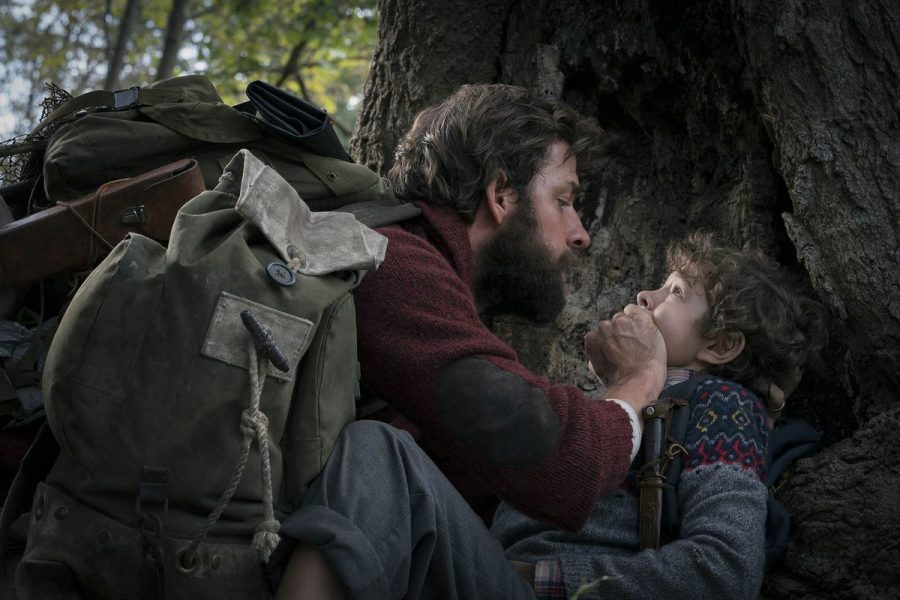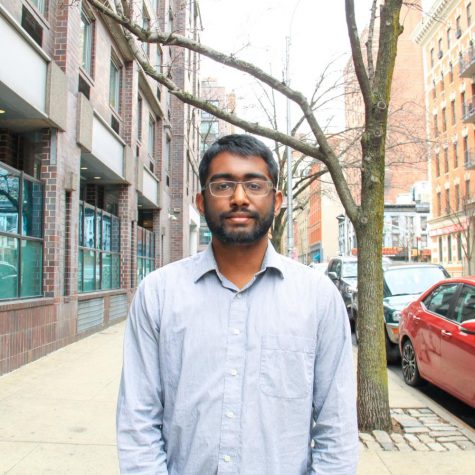Staff Recs: Intelligent Horror Films
Courtesy of Paramount Pictures
John Krasinksi in “A Quiet Place.”
April 27, 2018
“If they hear you, they hunt you” is the tagline for John Krasinski’s 2018 horror film “A Quiet Place.” Earning a 95 percent on Rotten Tomatoes and raking in over $200 million at the box office, the unsuspecting masterpiece centers on a family who must live in silence while hiding from blind monsters that hunt by sound. Joining the ranks of “Get Out” and “Don’t Breathe,” “A Quiet Place” nixes blood and jump scares for a more cerebral and innovative cinematic viewing experience. Bearing in mind its success –– and planned sequel –– this renaissance in intelligent horror seems to be the future of the genre.
The Academy of Motion Picture Arts and Sciences agrees. In its 90 years, the only horror films it has thrown a nomination or two to have been highly-complex, genre-defying masterpieces like “The Silence of the Lambs,” “The Sixth Sense,” “Black Swan” and most recently, “Get Out,” which won an Academy Award for best original screenplay. According to some critics, “A Quiet Place” is this year’s Oscar-bound intellectual thriller, and to celebrate, WSN has compiled a list of the best and most intelligent horror films. So brace yourself for a list of wildly innovative, quality horror films to occupy your future movie nights forever and ever and ever.
“Black Swan”
Ryan Mikel, Arts Editor
I was not allowed to watch “Black Swan” for the longest time. But when I finally got my hands on it, I was traumatized for life. One of the less pretentious films in director Darren Aronofsky’s catalogue, the psychological thriller follows overdue ballerina Nina (Natalie Portman) and the physical and psychological challenges she encounters when preparing for the role of a lifetime –– the Swan Queen in “Swan Lake.” Now be warned: this is less of a horror film and more of a case study on the “tortured artist,” comparable to Miles Teller’s character in Damien Chazelle’s “Whiplash.” Aronofsky holds a soft spot for torturing his films’ leading ladies, like the vegetative, amphetamine-addicted Ellen Burstyn in “Requiem for a Dream” or Jennifer Lawrence in “mother!” Here, Aronofsky makes no exceptions. We see Nina slowly deteriorate into a paranoid and compulsive shell of herself when the dual role of Swan Queen –– Odette (White Swan) and Odile (Black Swan) –– becomes too demanding. Portman’s descent into madness and the tragic final act, along with the realities of sexual harassment and eating disorders, make for a harrowing look into the often not-so-glamorous world of ballet. In addition to nominations for picture and direction, the film also won Portman an Academy Award for best actress.
“The Shining”
Guru Ramanathan, Staff Writer
Despite deviating so much from its source material, Stanley Kubrick’s “The Shining” is as powerful and horrifying a film as the original Stephen King novel. The film is the pinnacle of psychological horror, providing an in-depth look into isolation, the evil within humanity and the pain of a broken family. Kubrick’s pacing is deliberate –– especially for a two-and-a-half-hour film –– and framing of shots is painfully impeccable. The first half is agonizingly slow which only makes the second half all the more thrilling when Jack Torrance (Jack Nicholson) and the audience descend into paranoia. Although his treatment of Wendy (Shelley Duvall) is inferior to that of King’s novel, Kubrick still crafts an intense and thought-provoking film that one can always get something new out of on repeat viewings.
“Assassination Nation”
Anubhuti Kumar, Highlighter Editor
“Assassination Nation” is the unexpected political anthem we need right now. A brilliant manifesto to the power of a demographic often, very incorrectly, labeled “frivolous” or “airheads” –– teenage girls. The film is an insightful and perceptive rendering of the very real unrest and rebellion of teen girls. In a genre that makes young girls the victims of knives and terror, “Assassination Nation” turns the tables, depicting all the subtle struggles, slut-shaming and sexism of a Trumpian world. It never turns to cheap tropes. These girls are smart, self-aware, hopeful in the face of hate and always supportive of and supported by their female friends. They are often more mature than the adults that are meant to raise them, proving age does not necessarily accrue wisdom. “Assassination Nation” acutely reminds us that these girls will soon be the women who run the world.
“As Above, So Below”
Tyler Crews, Opinion Editor
I hate horror movies. I hate jump scares. I hate ghosts. I hate everything about them. However, there is one horror movie with all of these components that I can not only sit through, but can actually enjoy. “As Above, So Below” tracks a mysterious adventure deep into the French catacombs. The most notable aspect of the movie is that it is all seemingly recorded from a handheld camera, adding to the grit of the film. The team slowly drops, one by one, until there are only a couple survivors in the end. It’s confusing, haunting and weird, and I have literally no idea why I am so into it, but I am. Perhaps it’s because it is so utterly ridiculous. I would definitely recommend it to someone who is looking to dip their toes into the bloody pool of horror movies.
“Candyman”
Alex Cullina, Staff Writer
Before Jordan Peele coined the term “socially conscious thriller” to describe his film “Get Out,” there was “Candyman,” the 1992 film directed by Bernard Rose. Helen (Virginia Madsen), a white woman researching urban legends, investigates the myth of the Candyman, an angry spirit who is said to haunt Chicago’s infamous Cabrini-Green housing project; the story goes that he was a free black man who, in the 1800s, was horrifically lynched on the site. Drawing a connection between America’s legacy of violent racism and the plight of Chicago’s predominantly-black urban poor population, this is a the rare horror movie that is both truly scary, while also having something to say.
“Raw”
Alejandro Villa Vásquez, Copy Chief
I must confess, I am a sucker for a good European arthouse film. Back in 2016, there were rumors going around the independent film scene that “Raw,” directed by Julia Ducournau, had audience members seeking medical attention due to the film’s graphic and grisly nature. Titled “Grave” in French –– which in Romance languages denotes something severe or intense –– this terror flick definitely lives up to its Romantic appellation. It follows a young vegetarian Justine (Garance Marillier) that has her first bite of forbidden fruit –– raw meat. She ferments a taste for flesh and sultry adventures. Cannibalism, anyone?
Email the Arts Desk at [email protected].
































































































































































